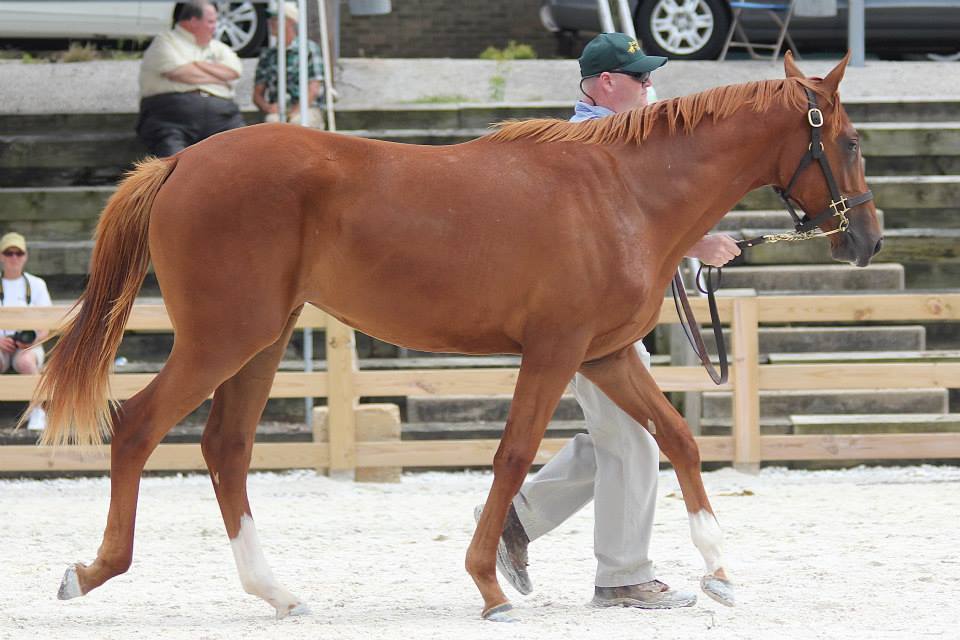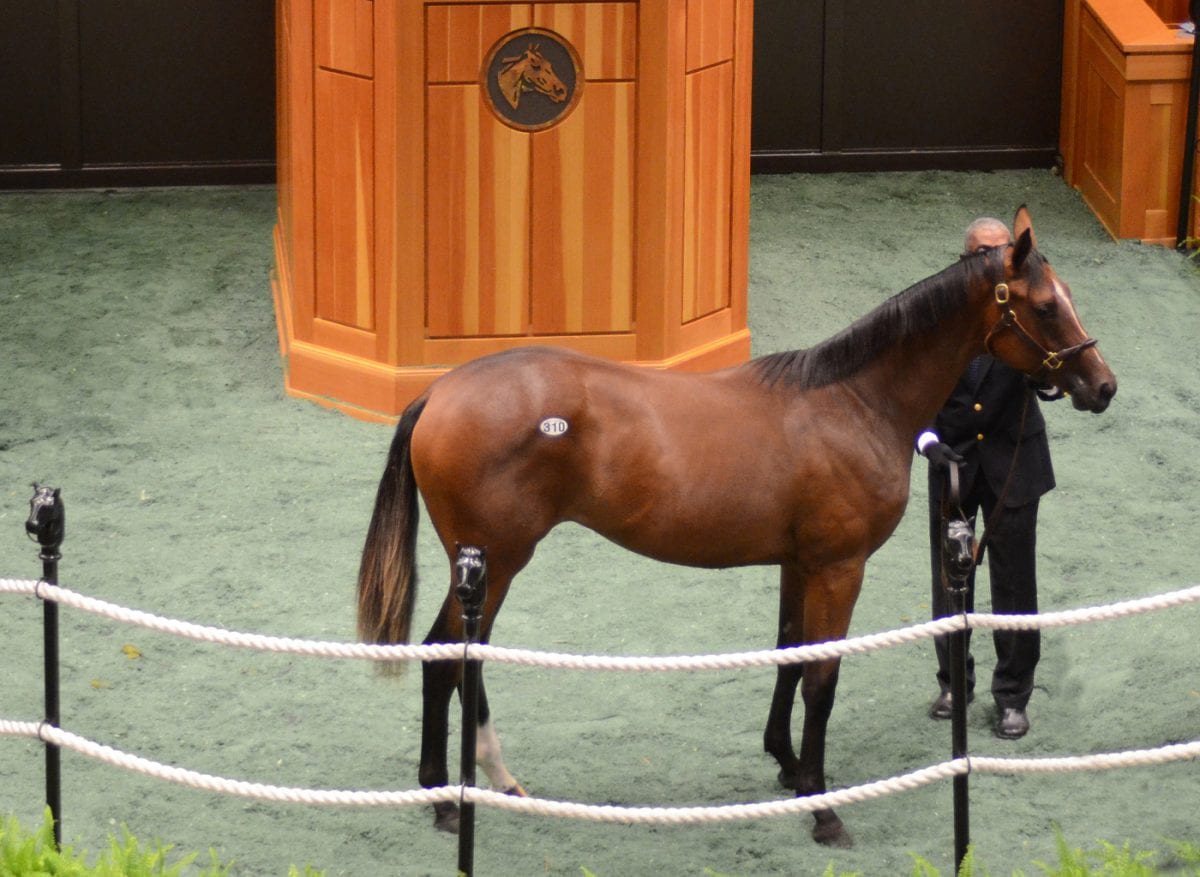
Yearling filly by Algorithms out of Silver Ashlee, by Red Bullet. Photo Dark Hollow Farm.
by Teresa Genaro
Late on Thursday afternoon, Dark Hollow Farm’s David Hayden got a call from an unknown number, a call he nearly didn’t pick up.
“It was the gas and electric company,” he said with amused incredulity. “They were telling me to be prepared for a huge storm.”
 The storm that initiated the unprecedented preemptive warning is Hurricane Joaquin, the northward route of which is still uncertain but which threatens to land right smack on the mid-Atlantic coast early next week. But as consignors look ahead to the Fasig-Tipton yearling sale at Timonium next week, the second of three yearling sales in a little over a month, weather isn’t their only concern.
The storm that initiated the unprecedented preemptive warning is Hurricane Joaquin, the northward route of which is still uncertain but which threatens to land right smack on the mid-Atlantic coast early next week. But as consignors look ahead to the Fasig-Tipton yearling sale at Timonium next week, the second of three yearling sales in a little over a month, weather isn’t their only concern.
Earlier this week in an article published by The Blood-Horse, consignor Reiley McDonald of Eaton Sales bemoaned the 30.9 percent buyback rate at a Keeneland yearling sale largely characterized as a success.
“For most breeders,” McDonald said, “the sale was a disaster.”
The problem is not, he said, with the quality of horses or the amount of money in the marketplace. The problem is, he believes, an unrealistic level of selectivity on the part of buyers who refuse to consider horses with even the slightest physical blemish.
That article was very much on the mind of Cynthia McGinnes, who with her husband Charles owns Maryland’s Thornmar Farm.
“Did you read that?” she asked. “That’s the biggest problem at the sales.”
Thornmar is bringing a consignment of 10 horses, mostly Maryland-breds, to Timonium, and while she’s confident in buyers’ desire for horses bred in the state, she is less confident about their ability to discern which physical ailments are significant and which should be overlooked.
“They want a completely clean horse,” she said.
And that, said Dark Hollow’s Hayden, who sold a Ghostzapper colt for $410,000 at Keeneland and who bred 1989 champion sprinter and Hall of Famer Safely Kept (MD), is unrealistic.
“You’re not going to find the perfect horse,” he said. “They’re not out there.”
McGinnes, who has been breeding and selling horses for 40 years, observed that the importance of veterinary records has emerged only in the last decade. Improvements in technology allow the tiniest of imperfections—“thinner than pencil lead,” she said—to be revealed in x-rays, and in a litigious society, those imperfections will cause potential buyers, including trainers, to shy away.
“And it’s to the detriment of the horse,” she declared. “If you want a horse with a completely clean x-ray, you have to hot-house it. You can’t let it run around.”
The McGinneses have refused to give in to that trend, even it means taking horses home.
“We turn out all of our horses until the night before the sale,” she said. “And if they don’t sell, we’ll give them to a good trainer and run them for the breeders’ awards.”
They have also resisted what she sees as a dismaying trend, the offers that come in almost immediately after horses have left the ring after failing to meet their reserve, often from people who didn’t bid.
“We don’t sell our horses back at the barn, especially if you want to pay me less than what was bid,” she said. “If you want our horses, bid in the ring.”
The Fasig-Tipton sale comes a little more than a week after the end of the marathon Keeneland yearling sale, at which more than 2,700 yearlings sold, and about two weeks before Fasig-Tipton’s two-day October sale of fall yearlings, with a catalogue of nearly 1,500 horses, a schedule that might lead buyers to bypass this sale and simply stay in Kentucky.
The threat of a major hurricane won’t do anything to increase traffic, but, Hayden pointed out optimistically, a benefit to this sale is its proximity to the major buyers in New York, New Jersey, and Pennsylvania. He also expects pinhookers like Eddie Woods and Nick de Meric to come up from Florida, which will make the market for the best physical yearlings even tougher.
“There are things they won’t touch,” said Hayden, who will bring a 10-horse consignment, all Maryland-breds, to the sale. “Like sesamoiditis. It’s something horses grow out of, but they may need three or four months. Pinhookers don’t have that kind of time; they need to be able to start these horses in training right away, because they need to be ready for the two-year-old sales in March, April, and May.”
Still, both McGinnes and Hayden expect their Maryland-breds to sell well. Thornmar sold six horses last year for an average of $49,000, led by a $295,000 Maryland-bred filly by Trappe Shot out of the Silver Deputy mare Argentesque.
Hayden and Dark Hollow sold four last year for an average of $93,000, the top price of $200,000 also for a Maryland-bred, also a filly, by Pure Prize out of He Loves Me (Not For Love), winner of the 2003 Iowa Oaks (gr. III).
While the buyers may have been selective last year and the schedule no more propitious than it is this year, at least consignors last year didn’t have to worry about the unpredictable path of a hurricane. Still, Hayden was largely undaunted.
“It’s gonna be what it’s gonna be,” he said, speaking of Joaquin. “We’ve got no control over that.”
Which, with yearling prep done and the catalogue in place, is as true for Tuesday’s sale as it is for a storm as unpredictable as a young Thoroughbred.









I will be looking to buy at the Timonium sale, and what strikes me about this article is the absence of the opposite side of the coin, that of the buyers. What I’ve seen increasingly over the years of buying yearlings are unrealistic reserves. A horse isn’t “worth” what a consignor sets as a reserve, it’s worth exactly what a live buyer is willing to pay, TODAY. Also absent from the article is mention of consignors making phony bids on their yearlings in order to falsely raise the RNA price. Believe me, I’m not stupid, and can see pretty easily when it happens.
So what I will do is take a very hard eye to the consignments available at Timonium, have the ones I am interested in vetted, and before the sale I will set a firm price. Most of the time I will be outbid. Sometimes I will buy a horse at my limit price or below. Occasionally, I will approach the consignor on an RNA and offer what the horse is worth. Sometimes I will buy something. I guess, based on the comments reported here, that I ought not waste my time looking over RNA horses consigned by Thornmar Farm. Useful information to know.
As neither a buyer nor seller, I feel I’m pretty objective and have to agree with Virginia Horseman’s point of view. Good news is the weather will be beautiful Tuesday ! Good luck to both sides.
Like Bill, I am neither a buyer or seller… just a bettor! But I am certainly intrigued by this aspect of the game. I have never attended a “sale” but always wanted to just to soak it all in, as I have aspirations of ownership via partnership one day.
Based on VA Horseman’s comments, I’d like to hang with you to get an education.
Gary,
I guess grass is always greener, but I was thinking how lucky the buyer and seller are in the above piece. Wouldn’t it be great to produce a foal and get them ready for a sale? Or go to sale with a $100,000 burning a hole in you’re pocket to buy a 2 yr. old? Almost got into the game in the early 90″s. I was living in Seattle and jockey agent I had become friends with begged me to go to Yakima Meadows to help him with his book of jockey’s. I didn’t go (and Yakima Meadows makes Charlestown look like Keenland) and I sort of regret it now!
Bill;
I hear ya! You need to start somewhere and Yakima Meadows sounded like the perfect place to start. The only thing holding me back is myself… and my creditors. LOL
How many of those “perfect” horses can actually run? I mean REALLY run???
I got one. Exactly that and no more. Bought in the ring with (apparently) no reserve. Didn’t buy one from the Thornmar consignment, LOL. But I did spend a good deal of time with a well-known consignor negotiating on an RNA. He/she’d rather run that one than sell it to me for what I judge it to be worth. Good for him. I wouldn’t pay what he/she thought it worth, and in a year or two we’ll see which of us proves correct.
That’s how the goes. I asked one buyer which of his purchases he liked, and he said, “I’ll tell you in two years. You know, it’s like gambling: I love a horse at 10-1 but i hate him at 2-1. Some of these I love at $10,000, but I would hate for $50,000.” THe search for values continues…